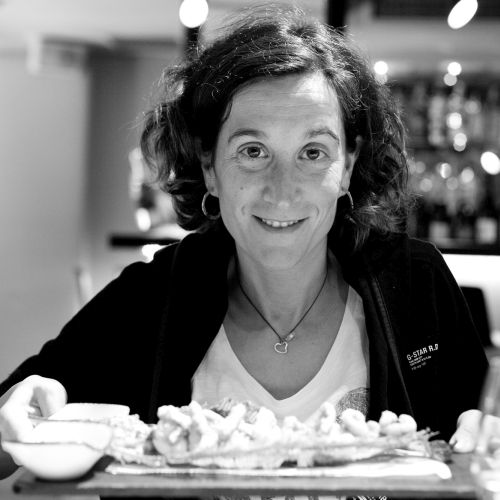Ensuring that everyone eats with dignity
- Books
- Culture Folder
- Oct 21
- 4 mins


As a rule, the word sustainability in relation to food is understood to be linked to the concepts of local, seasonal, organic, fresh produce and even generates limited waste. Tothom a taula!, published by Barcelona City Council, goes beyond this meaning and points to another key concept: the guarantee of everyone's right to eat with dignity.
To stop the definition from seeming utopian, the book breaks down personal initiatives that work daily in each of the stages of food (food acquisition, preparation and distribution). And we find out what they are called and what work they do. For example, the soup kitchen Gregal, run by the sisters Merche and Montse Rodríguez, who feed body and soul. Or the work carried out by Mariona Ortiz and Laia Carulla, at Pont Alimentari [Food Bridge], recovering (fresh and cooked) food that is about to be thrown away but is still in optimum conditions. They act as mediators between donors (supermarkets, grocery stores, occasional catering events and dining facilities) and recipients, i.e. “social organisations that handle food rescue and recovery”. To ensure things run efficiently, Ortiz and Carulla have adhered to a protocol set out by the Catalan Food Safety Agency.
Sustainable food must also be transferred to soup kitchens, one of the fundamental pillars of change. Until a few years ago, organic food was within the reach of those with greater purchasing power, but today this is no longer the case. Eating fresh food grown in an environmentally friendly manner is also possible thanks to people like Alejandro Guzmán, who worked in Michelin-starred restaurants and is now striving to bring the best lettuce and tomatoes to schools. “Behind the model of food consumption is a model of society”, asserts Guzmán, and this is the idea that pushed him to leave the restaurant industry to make his dream come true, Ecocentral. “At Ecocentral they want to put an end to the lack of connection between consumers and farmers by creating an innovative local network of agro-ecological stores called Eco d’aquí.” The first, in Barcelona’s Gràcia neighbourhood. The most innovative initiative? Food labels (not made of plastic), which give the photo, name and contact details of the farmer.
Ethical distribution
Organic food is not something new. Back in 1991, Núria Cantí set up the Hortec cooperative in the Gràcia neighbourhood, dedicated to the distribution of organic food when no one else did. The goal? To achieve ethical distribution. “Hortec is committed to ethical distribution that respects the farmer and provides a good service to stores, because they are a powerhouse for agroecological consumption.” They also ensure that the product has a fair price so that the consumer can afford it and is happy with what they eat.
Sustainable initiatives also reach restaurants. And, again, thanks to personal initiatives. This is the case of Isabel Coderch, from the consulting firm Te lo sirvo verde, who realised that organic food could reach more layers of society if it got to restaurants. And that is how she got in touch with the Udon group, which, with its capacity, can “transform the food model”.
We must bear in mind that, according to the epidemiologist Carlos A. González Svatetz, “one third of the calories consumed by the population comes from ultra-processed foods, which include energy or sugary drinks, crisps, industrial pastries, breakfast cereals or pizzas and pre-cooked food. (…) Recent prospective studies indicate that eating ultra-processed foods can increase the risk of being overweight, hypertension, cancer, metabolic syndrome and asthma, among other diseases”.
And this is another great workhorse: prioritising fresh foods over ultra-processed ones. Growing fruit and vegetables can be a good way for children and young people to understand that only what comes out of nature is fresh, while everything else is the outcome of an industrial transformation process.
Tothom a taula! Retrats de l’ecosistema alimentari sostenible d’una Barcelona en transformació [Portraits of the Sustainable Food Ecosystem in a Barcelona in Transformation].
Lucía Herrero (photographs) and Jordi Bes Lozano (text)
Barcelona City Council, 2020
208 pages
The newsletter
Subscribe to our newsletter to keep up to date with Barcelona Metròpolis' new developments




